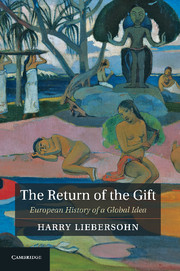2 - Liberalism, Self-Interest, and the Gift
Published online by Cambridge University Press: 10 January 2011
Summary
One can observe a confusion about gift exchange among late eighteenth-century makers of empire, who could not live with it and could not live without it. James Mill a generation later tried to put an end to the uncertainties surrounding gift giving in India by refusing to admit that it existed at all except as another name for corruption. In the liberal utilitarian tradition that he represented so robustly, British governors and Indian princes who exchanged gifts were furthering nothing but self-enrichment, which was poorly disguised by excuses about local custom or recognition of social rank.
Marcel Mauss, concluding his essay on the gift, thought that this kind of utilitarian incomprehension represented a turning point in modern history. He opposed the utilitarian “notion of interest, of the individual search after what is useful,” to the gift. This conception of the useful, he wrote, hardly existed in indigenous societies around the world, or in the classical world, or in Europe itself as more than a subordinate principle until a few centuries ago. “One can almost date – since Mandeville's The Fable of the Bees – the triumph of the notion of individual interest.” Thus, Mauss offered a starting point for the theoretical controversies culminating in his own essay: the theories of economic self-interest first clearly stated in early modern England.
- Type
- Chapter
- Information
- The Return of the GiftEuropean History of a Global Idea, pp. 27 - 60Publisher: Cambridge University PressPrint publication year: 2010



